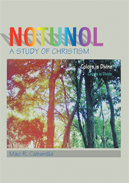
 |
Cabanilla lobbies for a reconciliation between science and faith, arguing that the purely materialistic view of the cosmos is limited because it can’t explain the existence of beings capable of rational thought. Mere matter, in his estimation, could never contemplate itself. Crucial to his understanding is a belief that Christianity, while the noblest system of religion on offer, needs to adapt itself in response to recent advances in scientific learning if it hopes to maintain adherents in the modern age.
The author's doctrine of “Christism” posits itself as a more enlightened version of traditional Christianity. God the Father in this system is best understood as the void or nothing out of which the universe was created at the beginning of time. God the Son is the material cosmos who seeks to make himself known in self-revelation to existing creatures. The goal towards which all human beings are striving isn’t, as some faith traditions have asserted, a perpetual disembodied existence in a heavenly realm but physical immortality within this dimension of time and space. Though Cabanilla is adamant that there remains only one absolute truth rather than a plethora of competing truths, he thinks people differ in their capacity to receive and understand truth, which is why the different religions are necessary. He puts forward the teachings of Christism not as a rival to existing faith traditions but in the hopes that people will better understand their purpose in the world, which is to believe in God and obtain immortality through that belief. He speaks approvingly of Jesus, St. Paul, and Martin Luther, whom he believes were trying to convey this essential truth according to the light that they had. Cabanilla takes pains to assure readers that they can “upgrade” their current faith by embracing Christism without fear of losing their salvation in the tradition they currently practice. Despite the often scientific-sounding jargon with which he presents his tenets, he’s merely putting a new gloss on long-existing beliefs.
Cabanilla’s curiosity and willingness to reconsider the meaning of basic Christian doctrines are commendable. Jungian psychologist Edward Edinger wrote that some souls are “hermetic,” meaning they feel a keen hunger for hidden or esoteric forms of knowledge. In his willingness to defy received opinion in pursuit of a deeper revelation, Cabanilla follows in the steps of the medieval alchemists, Giordano Bruno, and Jung himself. His theory that marriage is a symbolic representation of the cosmic union between spirit and matter evokes the Kabbalistic teaching about the Garden of Pomegranates mentioned in the Song of Songs. There are moments when the book reads like an extended riff on Madeleine L’Engle’s Wrinkle in Time quartet, with its daring fusion of science and religion and veneration for previous explorers in the realm of the spirit.
Although the book might upset the incurious, there’s little here to offend genuine seekers of wisdom. One could quibble with the notion that rabbinic Judaism was “racist” and that Paul was the first Jew to declare God’s love for people of all nations. In fact, Judaism has always maintained that non-Jews can have a relationship with God, and that, in the words of the Talmud, “The righteous of all nations have a share in the world to come.” Cabanilla is on firmer ground when he describes the mysterious, ineffable nature of God as depicted in the Bible. He also astutely notes the difficulty of reconciling the portrayal of God in the Hebrew scriptures with the portrayal of God in the New Testament, acknowledging that there are subtle differences in theme and emphasis. The book is a thrilling read for anyone who is spiritually adventurous and willing to have their understanding of faith challenged. Though Cabanilla’s language takes some getting used to, there are pearls to be gleaned for those who commit to the journey.